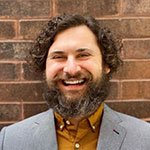Spreading the Science of Sustainability
The Sustainability in the Product Development Process course helps mpd² students understand how to make environmentally responsible product design a priority throughout organizations.
Students in Northwestern Engineering's Master of Product Design and Development Management (mpd²) program spend half of their first quarter learning about sustainability. One of the first lessons they learn is while many businesses are introducing sustainability teams to their organizations, those teams on their own will rarely succeed at bringing about drastic change.
To be successful, companies must have sustainability advocates incorporated throughout the organization. Students in the Sustainability in the Product Development Process course learn to be just that as they develop data-driven approaches and ultimately become environmentally responsible product design advocates.

“If you’re trying to improve sustainability of a product or an organization, the sustainability team on itsown isn’t going to be able to do that,” said Craig Arnold, a veteran of sustainability initiatives in the corporate world, including eight-plus years as a senior environmental design engineer with Apple. “They need product designers who are going to work with them toward that goal. You can’t accomplish much if you’re working in a vacuum on the sustainability team.”
Arnold co-taught the course this fall with professor emeritus Stephen Carr.
The class began with what might sound like a simple task: defining sustainability. As students quickly discovered, a firm definition is not always easy to articulate, particularly if someone is pursuing environmental goals without identifying commercial realities.
“If you make a product that has a super-low carbon footprint but it doesn’t meet a current need, is it really sustainable?” Arnold said. “It’s not if people are going to choose the less sustainable option because that better meets their current needs.”
In Arnold's eyes, sustainability means meeting the needs of the present without sacrificing the needs of the future. Once that explanation was agreed upon, students were able to explore how to develop sound sustainability strategies that have tangible, measurable benefits.
The ability to develop big-picture strategies with measurable markers makes mpd² students more attractive job candidates, the instructors said.
“Most companies are at loose ends for how they go about complying with customers’ desire for more sustainable products,” said Carr, who has been a part of the Northwestern community since 1970 and affiliated with mpd² since the program launched 20 years ago. “These students in mpd² are going to step up the value they bring to organizations because of this course.”
This fall was Arnold’s first venture into the classroom to teach what he’s been doing with sustainability in the corporate world for a decade. His current role is as a carbon footprint expert with Watershed, a software platform that helps major companies like Spotify and Airbnb reduce and accurately report their carbon emissions.
He said one of his main goals with the class was showing students that sustainability is not a concept based on emotional strings — there is math and science behind it.
“What I really wanted to share is that sustainability is something that can be quantified,” he said. “It’s something you can measure, and it’s something you can take action on based on data and not just feelings.”
Arnold and Carr hope their students take the lessons learned in the class and apply them to businesses all over the world. Their goal was not to develop people content with joining sustainability teams; their hope was to inspire students to become product designers who can inspire and drive change with their sustainability efforts.
“It’s cool to be able to be working on what is one of the important problems of our times,” Arnold said. “The feeling that the work you're doing is pushing things in a direction that helps people, it really keeps you going, even when the work gets difficult.”
